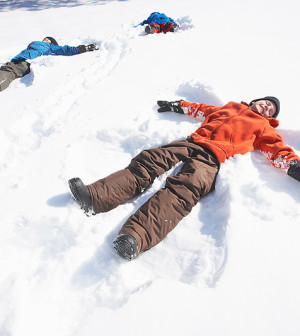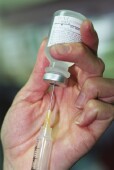- Stigma, Shame Hit Many Gay Men Affected by Mpox Outbreak
- Calories, Not Meal Timing, Key to Weight Loss: Study
- Dietary Changes May Beat Meds in Treating IBS
- Screen Pregnant Women for Syphilis, Ob-Gyn Group Advises
- Even With Weight Gain, Quitting Smoking in Pregnancy Still Best for Health
- A-Fib Is Strong Precursor to Heart Failure
- One Neurological Factor Keeps Black, Hispanic Patients From Alzheimer’s Clinical Trials
- Managing Blood Sugar After Stroke Could Be Key to Outcomes
- Dozens of COVID Virus Mutations Arose in Man With Longest Known Case
- Blood Test Might Someday Diagnose Early MS
Chickenpox Vaccine Not Responsible for Rise in Shingles, Study Says


The prevalence of a painful condition known as shingles is increasing in the United States, but new research says the chickenpox vaccine isn’t to blame.
Shingles is caused by the same virus that causes chickenpox, the varicella zoster virus. Researchers have theorized that widespread chickenpox vaccination since the 1990s might have given shingles an unintended boost. But that theory didn’t pan out in a study of nearly 3 million older adults.
“The chickenpox vaccine program was introduced in 1996, so we looked at the incidence of shingles from the early ’90s to 2010, and found that shingles was already increasing before the vaccine program started,” said study author Dr. Craig Hales, a medical epidemiologist at the U.S. Centers for Disease Control and Prevention. “And as immunization coverage in children reached 90 percent, shingles continued at the same rate.”
Once someone has had chickenpox, the varicella zoster virus stays in the body. It lies dormant for years, often even for decades, but then something happens to reactivate it. When it’s reactivated, it’s called herpes zoster or shingles.
Exposure to children with chickenpox boosts adults’ immunity to the virus, Hales explained. But experts wondered if vaccinating a whole generation of children against chickenpox might affect the rate of shingles in older people, who have already been exposed to the chickenpox virus.
“Our immunity naturally wanes over time, and once it wanes enough, that’s when the virus can reactivate,” said Hales. “So, if we’re never exposed to children with chickenpox, would we lose that normal immunity boost?”
To answer this question, Hales and his colleagues reviewed Medicare claims data from 1992 to 2010 that included about 2.8 million people over the age of 65.
They found that annual rates of shingles increased 39 percent over the 18-year study period. However, they didn’t find a statistically significant change in the rate after the introduction of the chickenpox vaccine. They also found that the rate of shingles didn’t vary from state to state where there were different rates of chickenpox vaccine coverage.
These findings, published in the Dec. 3 issue of the Annals of Internal Medicine, suggest the chickenpox vaccine isn’t related to the increase in shingles, according to Hales.
So what might be responsible for the increase in shingles?
Hales says experts aren’t sure. “We really don’t know why about one-third to one-quarter of people who’ve had chickenpox go on to develop shingles over their lifetime while others don’t,” he explained.
Hales did note that conditions and treatments that can compromise the body’s immune system have increased in recent years. “We thought perhaps that might explain the rise,” said Hales. “But we selected for people who didn’t have any diseases or take any medications that suppress the immune system, and we still saw an increase in shingles.”
He said the researchers also thought reported cases of shingles could be increasing because more people might see doctors as exposure to medical knowledge increases. But they found that the incidence of shingles was going up faster than the incidence of other conditions. If the increase in shingles were due to more people going to the doctor, the incidence of other medical disorders would also be rising, Hales said.
In the future, Hales said that because of the chickenpox vaccine, “shingles should be a relatively rare disease.” That’s because youngsters who are vaccinated will never have had the initial infection with the varicella zoster virus.
In the meantime, people who’ve had chickenpox should consider getting the shingles vaccine. And that means just about everyone. “Almost 100 percent of people in the U.S. have been affected by varicella zoster,” Hales said. The CDC recommends the one-time vaccine for anyone aged 60 or older.
Dr. Kenneth Bromberg, director of the Vaccine Research Center at the Brooklyn Hospital Center in New York City, echoed that recommendation.
“So far, we don’t know why there’s more shingles. But, there is a vaccine that can prevent it,” said Bromberg.
Shingles occurs most often in people older than 50. Early symptoms usually include mild to severe burning or shooting pain on one side of the body or face. Rashes or blisters emerge after that, and pain from shingles can continue for weeks, months or even years.
More information
Learn more about the shingles vaccine from the U.S. Centers for Disease Control and Prevention.
Source: HealthDay
Copyright © 2024 HealthDay. All rights reserved.










